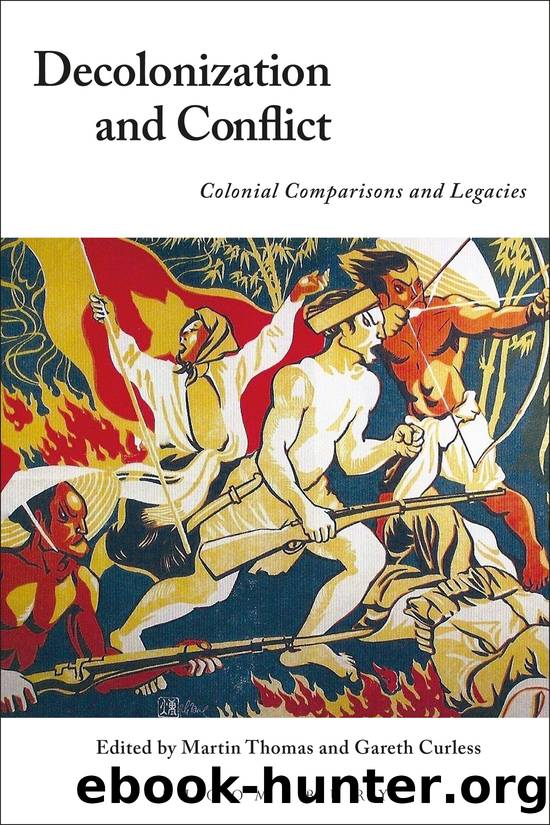Decolonization and Conflict by Martin Thomas Gareth Curless & Gareth Curless

Author:Martin Thomas,Gareth Curless & Gareth Curless
Language: eng
Format: epub
ISBN: 9781474250399
Publisher: Bloomsbury UK
7
Strategic Villages: Forced Relocation, Counter-insurgency and Social Engineering in Kenya and Algeria, 1952â621
Moritz Feichtinger
In 2012 and 2013 Kenya and Algeria, respectively, celebrated the 50th anniversary of the end of colonial rule. Official statements once again emphasized the unifying legacy of the wars of decolonization: âWe all fought for uhuruâ in Kenya and âun seul héros, le peupleâ in Algeria. Despite such evocations of a common and shared history, it is the memories of activists, freedom fighters and revolutionaries, often articulated through narratives of direct confrontation, that still predominate. Ambiguities, divided loyalties and the more complicated day-to-day experiences of ordinary people are rarely the subject of historiography and public commemoration. This absence is particularly shocking in the case of forced relocation of rural civilians, which was a major element of British and French counter-insurgency campaigns in Kenya and Algeria; indeed, perhaps the most common shared experience of colonial coercion. From 1952 to 1962, 1.1 million Kenyans and nearly 2.5 million Algerians were forcibly transferred into strategic villages and were compelled to remain there for between five and seven years.
At the time, British and French colonial military officials and administrators considered strategic resettlement a decisive turning point in their anti-guerrilla campaigns, while anti-colonialists denounced the camps and villages as âconcentration campsâ and derided the entire strategy as a crime against humanity.2 Historiography has not entirely ignored the phenomenon of forced resettlement, but there are few studies devoted exclusively to it.3 Research on forced mass displacement and resettlement in late nineteenth-century colonial warfare has revealed the long tradition of this strategy to coerce and control colonized populations. Yet, the transformative and reformist incentives characteristic for post-1945 programmes of strategic resettlement were largely absent in earlier colonial âconcentration campsâ run in Cuba, South-West Africa and the Philippines.4 Most of the literature on post-1945 strategic resettlement is still written by scholars of counter-insurgency strategy (often with a military background), who are mainly interested in its tactical value and its practicability.5 Marxist scholars of the 1970s on the other hand have analysed mass removal as just one element in the wider process of class formation and economic transformation during the shift from formal colonial rule to neocolonialism.6
This chapter combines three levels of analysis that signify a new direction in research on strategic resettlement. The work begins from the proposition that it is ethically and academically imperative to take the experiences and perspectives of the affected people into account. Local variations, complexities and contradictions should not be sacrificed to an abstract theory, but have to be taken seriously as crucial elements of the daily-life experience of the resettled.7 Second, repressive and reformative aspects of strategic resettlement need to be analysed together. Neither the dynamics and processes of resettlementâs implementation nor its scale and long-term effects can be wholly understood if the process is viewed exclusively from a military or economic perspective. Third, a comparative approach makes it easier to reach general conclusions about strategic resettlement and colonial counter-insurgency. Only systematic comparison enables us to distinguish specific local outcomes from generalizable elements and impacts that are structurally inherent to the strategy.
Download
This site does not store any files on its server. We only index and link to content provided by other sites. Please contact the content providers to delete copyright contents if any and email us, we'll remove relevant links or contents immediately.
Never by Ken Follett(2889)
The Man Who Died Twice by Richard Osman(2301)
Machine Learning at Scale with H2O by Gregory Keys | David Whiting(2295)
Fairy Tale by Stephen King(2073)
Will by Will Smith(2045)
Friends, Lovers, and the Big Terrible Thing by Matthew Perry(1335)
The Becoming by Nora Roberts(1332)
A Short History of War by Jeremy Black(1300)
Go Tell the Bees That I Am Gone by Diana Gabaldon(1238)
515945210 by Unknown(1210)
443319537 by Unknown(1076)
Works by Richard Wright(1020)
Going There by Katie Couric(993)
The 1619 Project by Unknown(991)
472244821 by Unknown(986)
Living Planet by David Attenborough(898)
264099364 by Unknown(866)
386736962 by Unknown(822)
Bourdain by Laurie Woolever(799)
